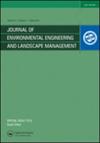METAGENOMIC ANALYSIS OF MICROBIAL CONSORTIUM GF-20 IN CORN STOVER DEGRADATION AT LOW TEMPERATURE
IF 1.1
4区 环境科学与生态学
Q4 ENVIRONMENTAL SCIENCES
Journal of Environmental Engineering and Landscape Management
Pub Date : 2023-03-15
DOI:10.3846/jeelm.2023.18489
引用次数: 0
Abstract
In our previous work, a microbial consortium GF-20 (Qinggeer et al., 2016) was enriched from compost habitats and adapted to efficiently and stably degrade corn stover under low temperatures. While the main microorganism and degradation-related functions and degradation-related coding enzyme genes of GF-20 were not clear. Therefore, the current study used the metagenomic to decipher the systematic and functional contexts within such microbial consortium under low temperatures. The results showed that the dominant functional microbials in GF-20 consortium were bacteria. The dominant phylums in GF-20 consortium were Proteobacteria (62.84%) and Bacteroidetes (10.24%). The dominant genus was Pseudomonas (50.84%), followed by Dysgonomonas (5.86%), Achromobacter (4.94%), Stenotrophomonas (3.67%) and Flavobacterium (2.04%). The metabolism was mainly composed of carbohydrate metabolism and amino acid metabolism, and included signal transduction, cell transport and other metabolic modes. The functional genes encoded were mainly distributed in glycosidolytic enzyme genes, and the functional enzymes were β-glucosidase, acetyl-CoA, pyruvate dehydrogenase and galactosidase. The GF-20 microbial consortium degraded the cellulose in corn stover primarily by β-glucosidase and endoglucanase, which were produced by 12 genera of microorganisms. The hemicellulose synergistic effect was produced by 15 genera of microorganisms including xylanase, xyloglucanase, mannolanase and branching enzyme.玉米秸秆低温降解微生物联合体gf-20的宏基因组分析
在我们之前的工作中,微生物联合体GF-20 (Qinggeer et al., 2016)从堆肥栖息地富集,适应在低温下高效稳定地降解玉米秸秆。而GF-20的主要微生物及降解相关功能和降解相关编码酶基因尚不清楚。因此,目前的研究使用宏基因组来破译低温下这些微生物联合体的系统和功能背景。结果表明,GF-20菌群中功能微生物以细菌为主。GF-20联合体的优势门为变形杆菌门(62.84%)和拟杆菌门(10.24%)。优势属为假单胞菌(50.84%),其次为厌单胞菌(5.86%)、无色杆菌(4.94%)、窄养单胞菌(3.67%)和黄杆菌(2.04%)。代谢以碳水化合物代谢和氨基酸代谢为主,包括信号转导、细胞转运等代谢方式。编码的功能基因主要分布在糖苷酶基因中,功能酶为β-葡萄糖苷酶、乙酰辅酶a、丙酮酸脱氢酶和半乳糖糖苷酶。GF-20菌群主要通过12属微生物产生的β-葡萄糖苷酶和内切葡聚糖酶降解玉米秸秆中的纤维素。木聚糖酶、木葡聚糖酶、甘露聚糖酶和分枝酶等15属微生物产生了半纤维素协同效应。
本文章由计算机程序翻译,如有差异,请以英文原文为准。
求助全文
约1分钟内获得全文
求助全文
来源期刊
CiteScore
1.90
自引率
7.70%
发文量
41
审稿时长
>12 weeks
期刊介绍:
The Journal of Environmental Engineering and Landscape Management publishes original research about the environment with emphasis on sustainability.

 求助内容:
求助内容: 应助结果提醒方式:
应助结果提醒方式:


